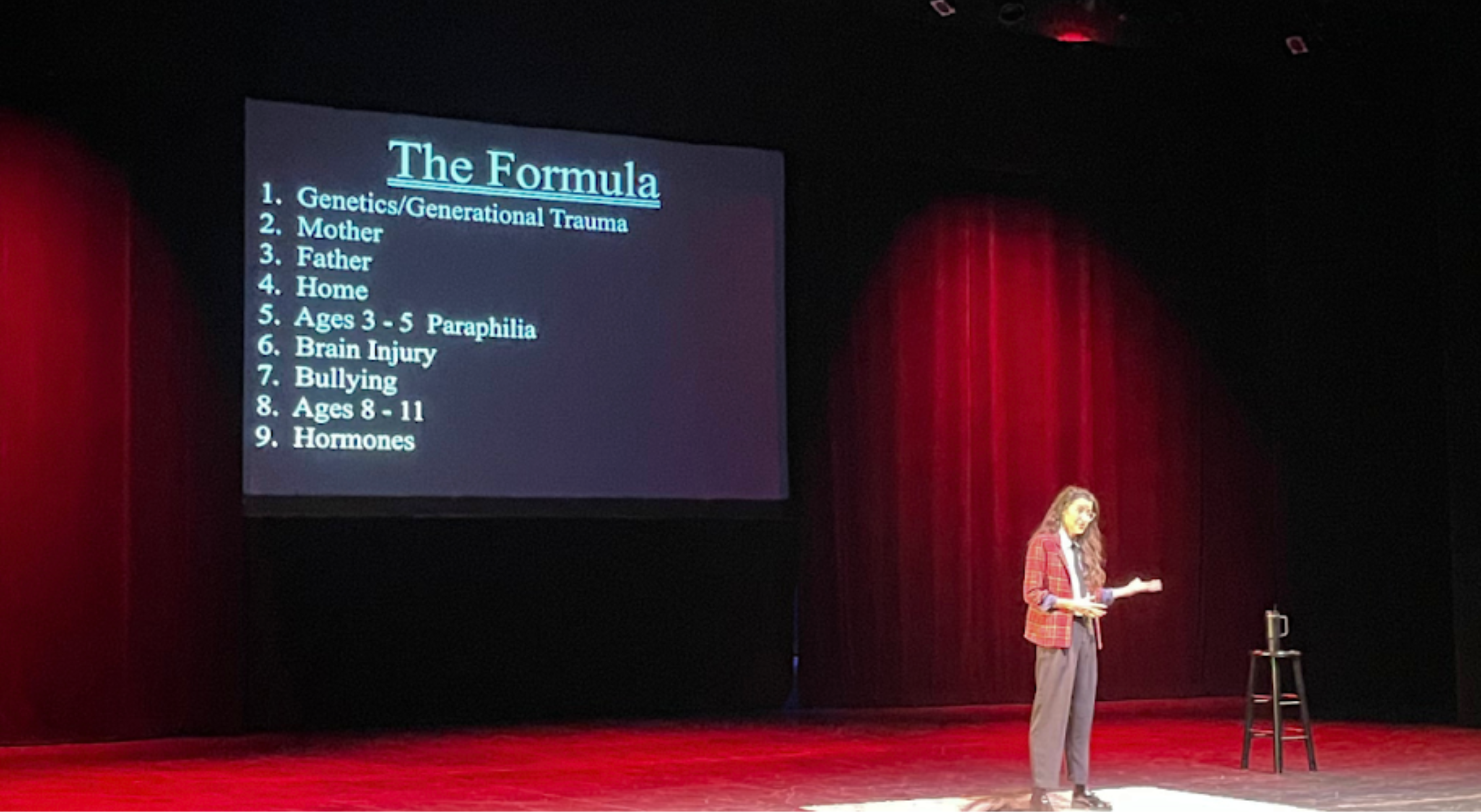THE EVENT ENCOURAGED ATTENDEES TO TACKLE CHALLENGING QUESTIONS: WHAT DRIVES INDIVIDUALS TO KILL REPEATEDLY? HOW DO THEY SELECT THEIR VICTIMS?
The room buzzed with an uneasy anticipation as attendees gathered for The Psychology of Serial Killers, a 90-minute masterclass led by Dr. Rachel Toles, a prominent clinical and forensic psychologist. Dr. Toles invited us into the psychology of those who commit heinous acts, explaining what might drive ordinary individuals toward extraordinary darkness.
The Fulcrum had the chance to interview Dr. Toles ahead of the event, gaining further insight into her motivation for studying the minds of serial killers. When asked what drew her to this line of work, she shared a deeply personal story.
“As a young girl, I was fascinated by death,” explained Dr. Toles, “in part because I witnessed a young girl get hit and killed by a car. There was something about the fantasy and reality of death that merged in my psyche. That experience ignited a lifelong curiosity about what makes people tick, especially those we consider dangerous.” This early experience, she explained, led her to question what differentiates someone who stays on a conventional path from someone who becomes a serial killer.
She mentioned how as a young girl, she “fell in love with characters that were very misunderstood, like Boo Radley” from the novel and film, To Kill a Mockingbird. Dr. Toles explains that her interest stems from exploring how individuals labeled as “monsters” often appear surprisingly normal in everyday life.
Dr. Toles emphasized that many serial killers share deeply troubled backgrounds, often marred by abuse or trauma. “These people didn’t have a chance,” she explained, stressing that their actions typically emerge from a complex interplay of genetics, trauma, and family dynamics.
She elaborated on her belief that simply labeling someone a “psychopath” is often misleading and unproductive. “If we just slap a label on them and hate them the way the world already has… how is that helpful?”
Instead, she advocates for a more nuanced view: “I empathize with every human. These individuals — despite their horrendous actions — are still human beings, 99.9% genetically identical to you and me.”
The event’s format encouraged attendees to tackle challenging questions: What drives individuals to kill repeatedly? How do they select their victims? Dr. Toles proposed that serial killers often make chillingly calculated choices, frequently targeting people who remind them of figures from their past or appear vulnerable.
Dr. Toles explained that the roots of serial killers’ violent tendencies often trace back to specific early-life experiences and formative relationships, shaping their future actions in profound ways. She highlighted nine essential factors that contribute to the “formula” of a serial killer: generational trauma, the mother, the father, their home environment, ages three-to-five, brain injury, bullying, ages eight-to-eleven, and hormones.
During the lecture, a fascinating concept Dr. Toles introduced was the idea of paraphilias, a recurrent sexual interest marked by objects, activities, or events atypical in nature. An example of this concept she gave was the case of Jerome Brudos, known as the Shoe Fetish Slayer.
She explained how Brudos had a fascination with high heels which grew from his mother’s resentment for him not being born a girl. The pressures from his mother he faced as a young child illustrates how certain fixations can later evolve into disturbing behaviors. She suggests that early psychological trauma or unmet desires could play a pivotal role in shaping these later violent obsessions. Dr. Toles’ perspective highlights how these atypical interests can manifest early and influence a killer’s motives, almost as if these childhood fixations become part of their identity.
Dr. Toles was candid about the mixed consequences of the recent cultural trend of the media’s fascination with true crime. “The media has given these killers celebrity status, romanticizing their stories in ways that can be harmful,” she noted. Yet she acknowledged that this public intrigue can also promote awareness, helping people understand signs of concerning behavior that might lead to intervention.
In her Q&A session, Dr. Toles’s audience explored these points further, posing questions about the ethical limits of empathy and the future of forensic psychology. For students interested in the field, she told the Fulcrum a piece of wisdom: “Stay curious and don’t just accept the old narratives. In forensic psychology, more than anything, you have to ask why.”
In unmasking the psychology of serial killers, Dr. Toles left us with more questions than answers—a powerful reminder that understanding the human psyche is a complex journey, one that demands a blend of courage, empathy, and, as she put it, “the willingness to see beyond the label.”






